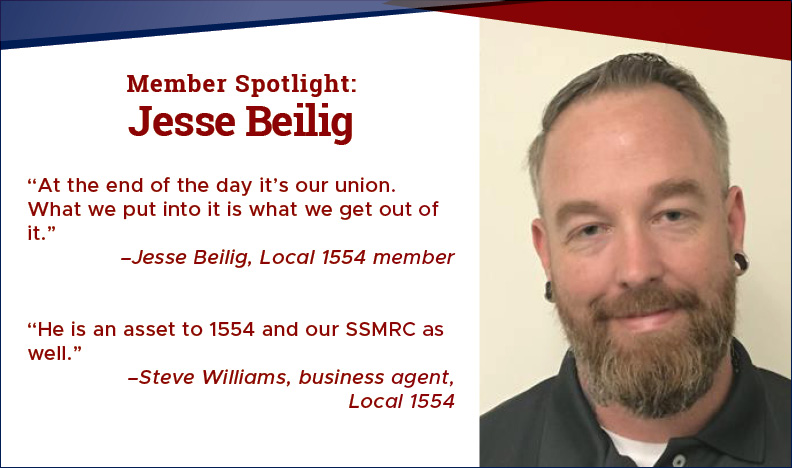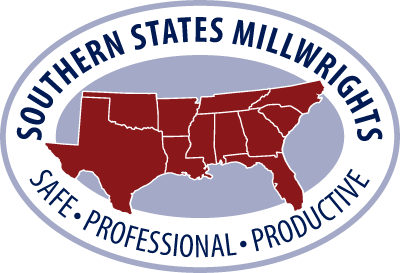Local 1554’s Jesse Beilig uses knowledge of international and local agreements as labor coordinator

Jesse Beilig, a member of SSMRC Local 1554 since 2015, is a Labor Coordinator and Resource Coordinator for Universal Plant Services in its Nashville, Tennessee, office. He credits the training and educational opportunities offered by the UBC and SSMRC for sparking his interest in labor relations and in taking on more leadership roles in the union.
Local 1554 Business Agent Steve Williams said Beilig is a member of the local’s executive board and a delegate to the council, and has also worked to mentor apprentices and created a Facebook page for the local’s membership to stay informed.
“He is an asset to Local 1554 and the SSMRC as well,” Williams said.
Beilig said he had worked in industrial maintenance jobs throughout his life, and always seemed to have a wrench in his hands whether at work or at home working on cars or motorcycles.
He was looking for a new career — and was sick of working jobs with low pay and no benefits — when one of the union’s signatory contractors recommended him to look into the millwrights.
Like many people who are unfamiliar with the SSMRC, Beilig first had to research what a millwright was and what they do, and after conducting that research, he found that his previous work experience was right in line with a millwright’s work. The extra benefits from joining a union only helped him make the choice to join.
“A lot of what the UBC had to offer really appealed to me as far as continuing education, benefit package and the strength of being under a collective bargaining agreement,” he said. “I wasn’t just an employee for somebody else.”
Beilig’s first job after joining the SSMRC was working at Bridgestone Tire, and he quickly learned that the education and training that the UBC offers were the key to advancing in his career. After taking as many classes as he could in areas like rigging and mechatronics, he found that the leadership classes offered at the International Training Center in Las Vegas were the ones that resonated with him the most.
Along with learning skills for his job through the different training courses, Beilig said ITC programs like 212 Journeymen, Collaborative Leadership and Foreman Training showed him how to better interact with his coworkers and the plant at which he was working.
“All of those things really had a huge impact on me, and are probably the favorite classes that I’ve taken.”
As part of his job at Universal Plant Services, Beilig interacts with business agents throughout the various states and jurisdictions in his office’s region that stretches from Tennessee north to Illinois and east through the Carolinas and up into New York. His duties consist of tasks like organizing manpower and tools for jobs, working with the different unions involved in the projects and answering questions regarding international agreements and local collective bargaining agreements.
The latter part of his job, working with the international and local agreements, is probably the favorite thing he does each day.
“Just like a lot of the UBC classes, knowledge is everything,” he said. “Having a better understanding about how specific areas work, and the differences between say the local agreement in 219, which is parts of Maryland and Pennsylvania, and how it differs from Tennessee. Those things I really enjoy.”
When out in the field, workers have their own tasks — remove this, install that, align this — but taking a step back and looking at the bigger picture of a job really shows how each millwright’s individual work is integral to the entire project, Beilig said.
Part of his responsibilities at UPS involve completing quotes for jobs, and seeing how much a contractor pays for millwrights for each hour on the job really shows how important one worker’s performance can be to the project and to the relationship between the union and contractors.
“All of these things affect productivity, and at the end of the day, the relationship with our partnering contractors is just as important as union membership,” Beilig said. “If our contractors aren’t successful, what incentive do they have to stay union? So it’s important for us in the field to give 100 percent every day.”
To go along with his work that deals with other unions and collective bargaining agreements, Beilig has also taken leadership positions within Millwright Local 1554. He is the vice-president of the local, and is a delegate to the Southern States Millwright Regional Council, and said he tries to get involved as much as he can and encourages others to the same.
“At the end of the day it’s our union. What we put into it is what we get out of it,” he said.
The spark to take on those roles came one day when he was discussing some workplace myths with another member, and he realized he did not know the answers to some of the questions that were being brought up.
He then reached out to Steve Williams to ask how to be more involved with his local and how to learn more about how the union works, and Williams recommended that he become a delegate. From that point on, Beilig decided to learn all he could about how the SSMRC operates, and he encourages other members to do the same.
“It’s up to us as members to keep it moving forward, from the first-year apprentice on the jobsite all the way up to our EST Wayne Jennings,” he said. “There’s always something we can do. Getting involved is a huge, huge thing.”
He said plenty of the members of the council, including Local 1554 Business Representatives Steve Williams and William Condon, as well as EST Wayne Jennings, have always been available to answer any questions that he has had or offer advice when needed.
Beilig is currently taking college courses through Cornell University for labor relations and contract negotiations, and he would like that education to carry over into his future with the SSMRC in some form.
“Ideally, I’d like to work in the capacity of helping to strengthen our council in any opportunity that may arise,” he said.
